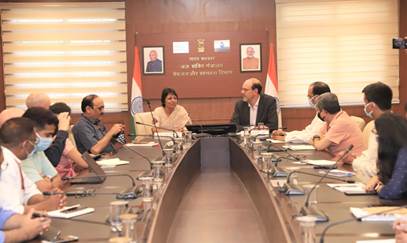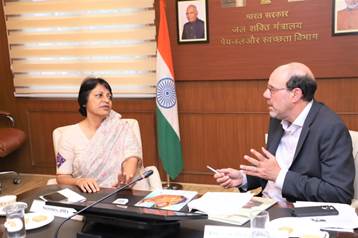
Nobel laureate Professor Michael Kremer today interacted with Smt. Vini Mahajan, Secretary and senior officers from Department of Drinking Water and Sanitation, Ministry of Health & Family Welfare, UNICEF and other sector partners at Antyodaya Bhawan, here today.
 Prof. Michael Kremer is an American development economist who was jointly awarded Nobel prize in Economics in the year 2019 with Abhijit Banerjee and Esther Duflo, for their experimental approach to alleviating global poverty.
Prof. Michael Kremer is an American development economist who was jointly awarded Nobel prize in Economics in the year 2019 with Abhijit Banerjee and Esther Duflo, for their experimental approach to alleviating global poverty.
Prof. Kremer while addressing the officials said that one important finding from his study was that nearly 30% infant deaths can be reduced if safe water is made available to families for drinking. Diarrhoea is a very common ailment especially among new-born children. The new-borns are susceptible to water ailments and survey undertaken during their research, draws a conclusion that 1 in every 4 deaths, pertaining to children can be prevented with provision of safe water. Therefore, ‘Har Ghar Jal’ programme plays a crucial role in improving health parameters especially among children.
Prof. Kremer was happy to learn that Jal Jeevan Mission was not just making water available in rural household, but it also ensured that water supplied was of prescribed quality. In this regard, regular testing of water sources and end points was carried out through water testing laboratory and community surveillance using Field Test Kits (FTKs).
 Smt. Mahajan, highlighted the challenges on sustainability and suggested that behavioral change is required at ground level to ensure that the water is used judiciously.
Smt. Mahajan, highlighted the challenges on sustainability and suggested that behavioral change is required at ground level to ensure that the water is used judiciously.
Shri Nicholas Osbert, Chief-WASH from UNICEF, India spoke on the impact of safe water on child health. Other sector partners like WaterAid and Wash Institute shared their views on importance of safe drinking water.
Shri Vikas Sheel, AS & MD, National Jal Jeevan Mission said that JJM offers new opportunities for undertaking operational research. He said, it was the right time to undertake such studies as the villages are at different stages of coverage. While few villages have 100% coverage, many villages have partial tap water supply while some were still dependent on fetching water from the stand post.
Prof. Kremer assured of collaboration in future with regard to safe storage of water, new and cost-effective water treatment technologies and impact studies on tap water availability in villages.
*****
BY



